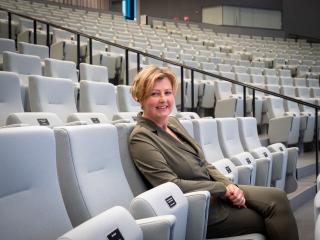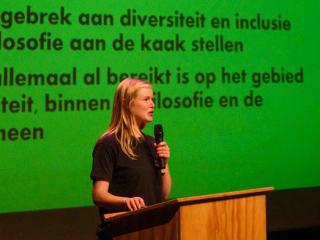Maintaining the talent pool for Tilburg: ‘We have all the ingredients, now let’s forge ahead’
Tilburg and the surrounding area are experiencing a brain drain, with many graduates leaving for jobs in other areas including the Randstad. What are the reasons for this and what can be done to stem the tide? Four Master’s students in Public Governance investigated these questions on behalf of the City of Tilburg. To their own surprise, their conclusion was that Tilburg exceeds expectations and has more to offer than you might think. However, greater efforts should be made to promote stronger ties between students and local employers. An interview with Anna Robin van Gestel, Daan Hillemans, Hidde van der Velde, and Zed Pellenaars as they gear up to step into the job market themselves.
Turn it for the better
Students offer solutions to societal challenges
- There should be more cooperation between all stakeholders of the job market.
- Tilburg University Career Days could make room for local enterprises.
- Tilburg needs a better image of the job market and the talent available.
Why did you take on this assignment from the City?
Daan: While I don’t really want to move to the Randstad, I’m having difficulty finding suitable job openings over here. So I was curious to investigate the reasons for this issue.
Zed: The same goes for me. As a student, I’ve developed fairly strong ties with the city and I’m an active member of the local branch of the PvdA (Dutch Labor Party). So I want to stay here, especially for my first job. Nonetheless, I can’t help but notice that lots of people I know are leaving. I also hoped this investigation would benefit the city of Tilburg.
Anna Robin: I’m from Tilburg and moved to the Eindhoven region to take a university of applied sciences program. Still, I find myself continually drawn to Tilburg. I was curious about why people like me want to leave, and why the Eindhoven region has a positive image in the job market but not Tilburg.
Hidde: For me, it was more about self-reflection. When you think of Tilburg, you think of studying, but leaving after graduation seems to be the general trend. Are there really no jobs available? And what am I looking for?
How did you investigate this?
One after another: We analyzed the Tilburg job market, especially the key emerging sectors, through interviews with key stakeholders, including the City of Tilburg, Citymarketing, Tilburg University, Fontys University of Applied Sciences, Midpoint Brabant, and The Tailors, a group of IT companies. We also conducted a survey among students, supplemented with focus groups, about what they find attractive in the city and what they need.
There are students who have the potential to contribute to the city and companies that could benefit from their skills, but they don’t seem to find each other very well
What were the results?
Zed: University students get an unbalanced view of the job market. At Career Days, the well-known, large companies from the Randstad are well represented, whereas our region is represented by just a few companies, if any at all. Small and medium-sized enterprises don’t attend either. One of the few companies in the region that university students could name is Schrobbelèr. At Fontys, internship assignments foster the connection between students and companies, an aspect in which the university is notably lagging. Anna Robin: And companies, in turn, have little understanding of the potential of our students.
Anna Robin: In addition to work and housing, which are obviously essential, students apparently value green spaces in the city as well as the cultural scene and, for international students, community building. They place importance on feeling at home in the city, even though their family or friends live elsewhere.
Daan: The main conclusion is: familiarity is key to breeding affection. There are students who have the potential to contribute to the city and companies that could benefit from their skills, but they don’t seem to find each other very well. So we need to expand the knowledge students and companies have about each other. Students are quite open to the option of staying in their city.
Hidde: Some students still want to leave, and that’s okay. But it’s too bad if that’s because they’re unaware of the possibilities.
The Spoorzone, together with Plan-t and Station88, shows how interaction can be enhanced
What is your advice for the City?
Daan: The job market stakeholder network needs to be strengthened and mutual cooperation must be improved. At the Career Days at Tilburg University, which are now organized by student associations with the view of making money, room could be made for small and medium-sized enterprises from the region. All the ingredients are in place to retain the talent pool, but unfortunately, cooperation is lacking. The City could take the lead in enhancing the ties between students and businesses.
Anna Robin: Fourteen years ago, politicians indicated their commitment to retaining the talent pool, but the situation today remains largely unchanged. There is nothing to ‘lubricate’ the interaction between business, government, and education. Zed: While the need for interaction has only increased in light of today’s tight job market.
Zed: The Spoorzone, together with Plan-t and Station88, shows how interaction can be enhanced. In our report, we therefore suggest using these as a base for dialogue, for example, in MindLabs. And we need to create a better image of the job market and the talent that is present in the city. This is where Citymarketing could play a role, by presenting Tilburg as ‘High Touch’. By doing this, you fuse the digital aspects of society with the social. With access to both these talents, we can confidently claim a leading position for Tilburg.
I didn’t expect the job market here to be so interesting
What will you do yourselves: leave or stay?
Anna Robin: Over the past few years, Tilburg has become a more attractive city and its future prospects are also very promising. I hope students will also notice this and that we’ll evolve from being a ‘working-class city’ to being a true ‘student city’. I’m applying for a job in Tilburg, but will continue to live in Waalre.
Hidde: I didn’t expect the job market here to be so interesting. Now I’m going to change tack in looking for a job.
Zed: This study has reinforced my desire to stay. The fact that everyone we interviewed took us seriously gave me reason to believe that we can really make a difference. The report was sent to the Municipal Executive via the talent development policymaker at the City of Tilburg. So, hopefully, we’ll see results within a few years.
-

Ton Wilthagen
Professor of Labor Market at Tilburg Law School and Tilburg City Professor"As a City Professor, I am committed to fostering an even better connection between the city, the university, and science. When an assignment was requested within the 'governance clinic' for students, I proposed the theme of talent retention, knowing that this has long been a contentious issue for the city and region. These students have enthusiastically and skillfully embraced this topic. Their research will certainly have an impact on retaining young talent in Tilburg. They demonstrated that Tilburg and graduates have much more to offer each other."
Want to know more?
Also in Tilburg University Magazine
Date of publication: 25 April 2024



